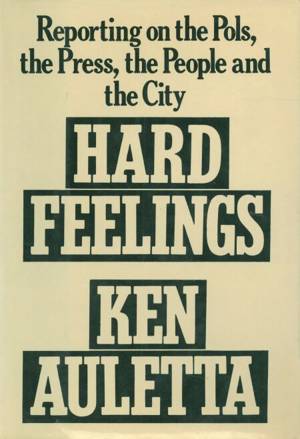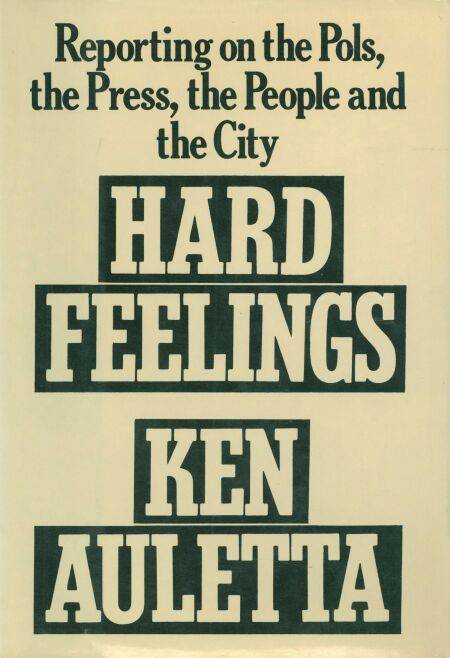
- Afhalen na 1 uur in een winkel met voorraad
- Gratis thuislevering in België vanaf € 30
- Ruim aanbod met 7 miljoen producten
- Afhalen na 1 uur in een winkel met voorraad
- Gratis thuislevering in België vanaf € 30
- Ruim aanbod met 7 miljoen producten
Zoeken
Hard Feelings E-BOOK
Reporting on the Pols, the Press, the People and the City
Ken Auletta
E-book | Engels
€ 4,59
+ 4 punten
Omschrijving
One of America’s leading reporters collects his most important, entertaining, and enlightening articles, explaining how and why he wrote them.
Hard Feelings represents more than five years of Ken Auletta’s work for The Village Voice, New York magazine, the Daily News, Esquire, and The New Yorker. During that period he won a loyal following and established a reputation as the rare journalist who covers both politicians and the government. He covered the news and made the news with his famous and controversial New Yorker profile of Mayor Ed Koch and his startling exposé of lawyer Roy Cohn in Esquire. These pieces also display his versatility—hard, investigative reporting as well as precise, thoughtful essays—with subjects ranging from the ambitions of Ted Kennedy to the tribulations of Jimmy Carter, the maneuvers of a local politician to the struggles of an embattled high school principal.
One of Auletta’s chief concerns is the press itself: how the former publisher of the New York Post managed the news; how media expert David Garth manipulates it; how Tom Brokaw became a victim of it; and how passion for scandal and easy cynicism threaten it. The postscripts he has written for this volume address many of the central issues of journalism. A case in point is Auletta’s own use of controversial taps revealing Mayor Ed Koch’s private feelings about relations between blacks and Jews; another is his examination of the questionable coverage of Nelson Rockefeller’s death. Does a public figure have a right to privacy? Is there such a thing as too much press access? To whom does the reporter owe allegiance? What are the ethics of journalism?
In his stories and his second thoughts on them, Ken Auletta offers a provocative analysis of how a reporter works, views his profession, and evaluates his achievements with intelligence and feeling—hard feelings.
Hard Feelings represents more than five years of Ken Auletta’s work for The Village Voice, New York magazine, the Daily News, Esquire, and The New Yorker. During that period he won a loyal following and established a reputation as the rare journalist who covers both politicians and the government. He covered the news and made the news with his famous and controversial New Yorker profile of Mayor Ed Koch and his startling exposé of lawyer Roy Cohn in Esquire. These pieces also display his versatility—hard, investigative reporting as well as precise, thoughtful essays—with subjects ranging from the ambitions of Ted Kennedy to the tribulations of Jimmy Carter, the maneuvers of a local politician to the struggles of an embattled high school principal.
One of Auletta’s chief concerns is the press itself: how the former publisher of the New York Post managed the news; how media expert David Garth manipulates it; how Tom Brokaw became a victim of it; and how passion for scandal and easy cynicism threaten it. The postscripts he has written for this volume address many of the central issues of journalism. A case in point is Auletta’s own use of controversial taps revealing Mayor Ed Koch’s private feelings about relations between blacks and Jews; another is his examination of the questionable coverage of Nelson Rockefeller’s death. Does a public figure have a right to privacy? Is there such a thing as too much press access? To whom does the reporter owe allegiance? What are the ethics of journalism?
In his stories and his second thoughts on them, Ken Auletta offers a provocative analysis of how a reporter works, views his profession, and evaluates his achievements with intelligence and feeling—hard feelings.
Specificaties
Betrokkenen
- Auteur(s):
- Uitgeverij:
Inhoud
- Aantal bladzijden:
- 320
- Taal:
- Engels
Eigenschappen
- Productcode (EAN):
- 9780307799647
- Verschijningsdatum:
- 2/08/2011
- Uitvoering:
- E-book
- Beveiligd met:
- Adobe DRM
- Formaat:
- ePub

Alleen bij Standaard Boekhandel
+ 4 punten op je klantenkaart van Standaard Boekhandel
Beoordelingen
We publiceren alleen reviews die voldoen aan de voorwaarden voor reviews. Bekijk onze voorwaarden voor reviews.







